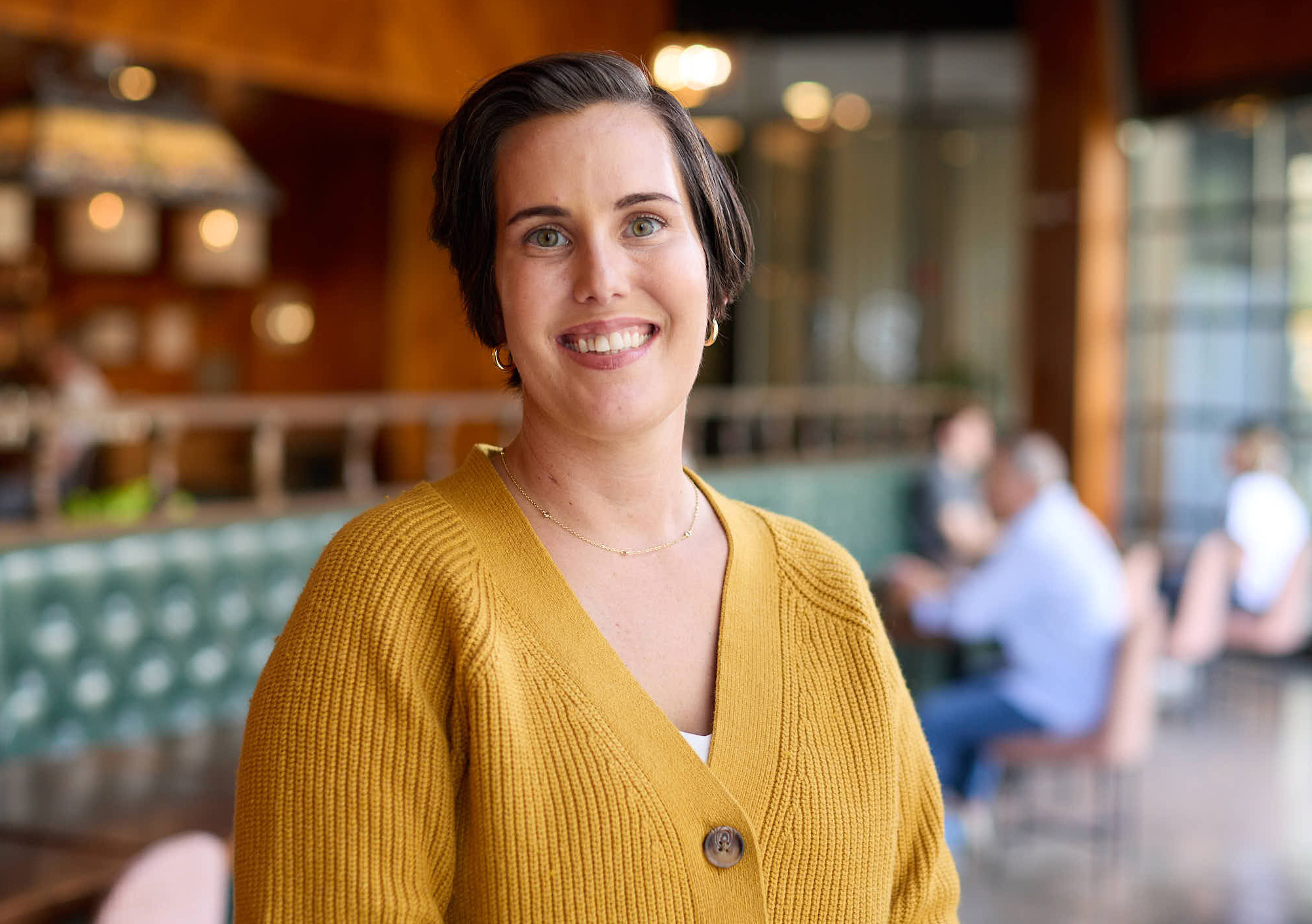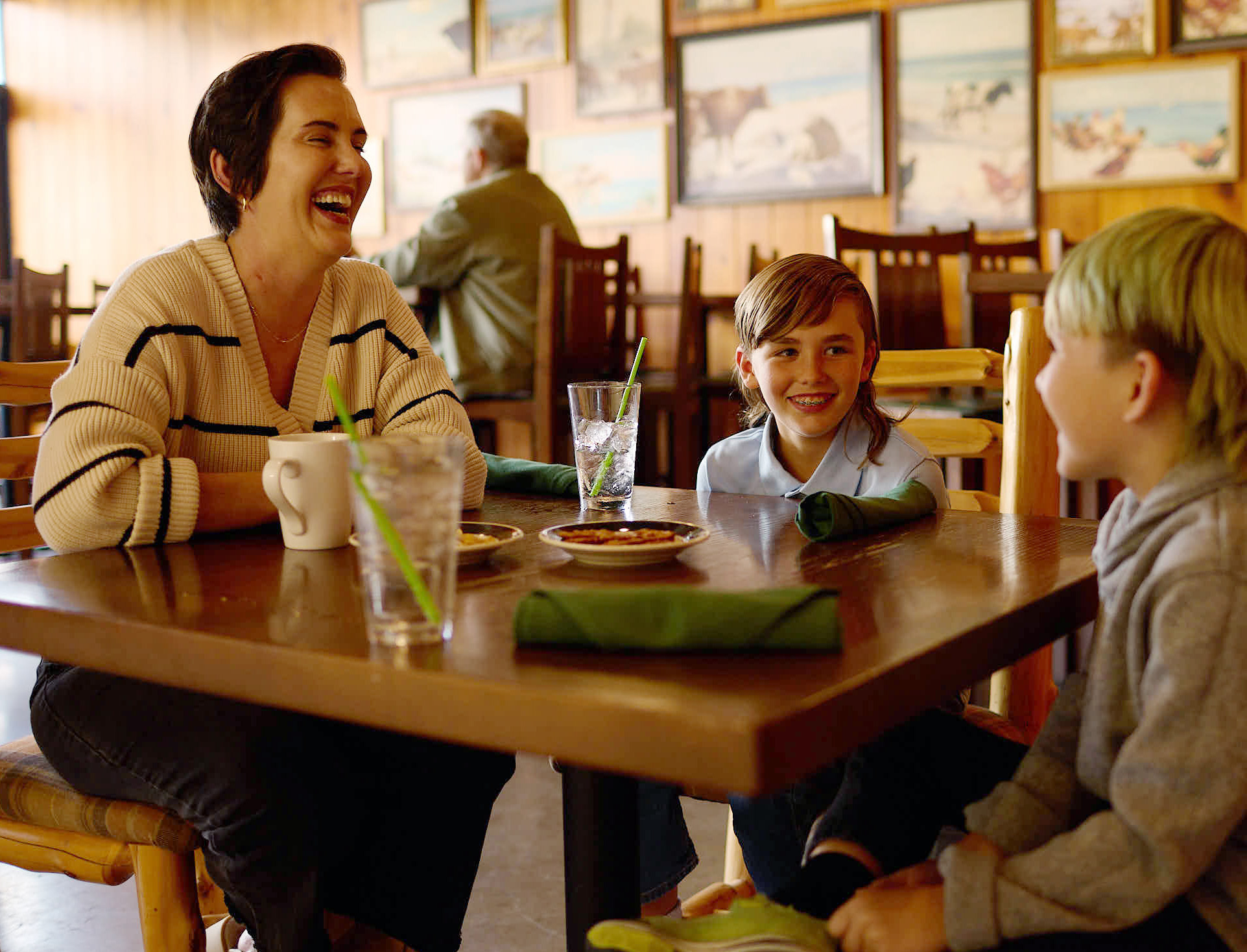Grateful for world-class cancer care close to home

When Quad Cities resident Christen Schulte Phelps was diagnosed with a rare breast cancer, she only had to drive a few minutes to receive treatment from University of Iowa Health Care.
While staying with family over Thanksgiving in 2022, Christen Schulte Phelps noticed a small dot on her breast.
The then 36-year-old was due for her annual checkup, so she called her primary care provider, who saw her two days after she returned home.
“She didn’t feel a lump, but she said to be on the safe side we should get it checked out,” Schulte Phelps says. “I had always thought breast cancer would be a lump. I never thought of it being a small dot.”
Shortly after Christmas, Schulte Phelps got the news that she had a rare type of breast cancer known as Paget’s disease of the breast. And because cancer was found during a lymph node biopsy, it was determined to be stage 2.
Shobha Chitneni, MD, oncologist at University of Iowa Health Care, says that while people should follow guidelines and get regular mammograms, it’s also important that they become familiar with their breasts and detect any potential changes. This can be especially helpful for people who are younger than 40 and not yet getting regular mammograms.
“Any lumps, bumps, or skin changes — if there’s any doubt, go to your family doctor and get it checked out,” Chitneni says.
Schulte Phelps’ treatment plan started with chemotherapy, which the Davenport, Iowa, resident was able to get only minutes from her home at University of Iowa Health Care Cancer Services — Quad Cities.
Schulte Phelps says the care team there instantly made her feel comfortable.
“I would walk in and just see smiles; it was like seeing old friends,” Schulte Phelps says. “If I had a question or needed anything, they were always there. And that went from when I was going through intake, when they were getting my chemotherapy port set up, to the nurses, the oncologists, and the infusion rooms. It was honestly just lovely. They made the most out of a bad situation.”
After finishing chemo in June 2023, Schulte Phelps had a double mastectomy. She says she appreciated all the information and support she got from her oncology surgeon and plastic and reconstructive surgeon when making decisions about her mastectomy and breast reconstruction.
“The conversation with my oncology surgeon (Ingrid Lizarraga, MBBS) was eye-opening,” Schulte Phelps says. “She was very forthright about all the things that I should consider. I only had cancer in one breast, but I ultimately decided to do a double mastectomy, and she was super supportive.”

Schulte Phelps had temporary tissue expanders placed during the mastectomy, which allowed her time to decide whether she wanted reconstruction and if so, what type.
“I really appreciated having that time to think and to have conversations about what I wanted with my plastic surgeon (Kelly Ledbetter, MD),” Schulte Phelps says. “She was very realistic, and I very much needed that realism. I also enjoy a little humor while I’m going through things, so that was appreciated as well.”
In October 2024, Schulte Phelps had a DIEP flap reconstruction, during which fat, skin, and blood vessels are taken from the lower belly and used to rebuild the breast.
The mastectomy and reconstructive surgery were performed at UI Health Care in Iowa City, where Schulte Phelps says she was treated like royalty.
“I just had the best nurses. Anything I needed, they were on top of it. They were so good to me,” Schulte Phelps says. “And there was this waffle breakfast sandwich on the menu that was so good. Maybe it was because I was on drugs, but it was!”
“I would walk in and just see smiles; it was like seeing old friends. If I had a question or needed anything, they were always there. And that that went from when I was going through intake, when they were getting my port set up, to the nurses, the oncologists, and the infusion rooms. It was honestly just lovely. They made the most out of a bad situation.”
Christen Schulte Phelps
University of Iowa Health Care cancer patient about Cancer Services — Quad Cities
Between the mastectomy and reconstructive surgery, Schulte Phelps underwent radiation and immunotherapy with UI Health Care in Bettendorf.
Chitneni, who treated Schulte Phelps at Cancer Services — Quad Cities, says getting a cancer diagnosis is frightening, but being able to get cancer care close to home can help ease some of the fear.
“Can you imagine having to travel one hour each way plus the time you spend there for treatment?” Chitneni says. “We want them to have a life besides just getting treatment for cancer.”
Along with being able to get the same world-class cancer care as they would in Iowa City, Chitneni says patients in the Quad Cities also have access to all the experts and specialized treatment available throughout UI Health Care.
“If it’s a rare or complicated disease, we can communicate with physicians at the university campus and get patients in quickly and efficiently for things that can’t be done locally,” Chitneni says. “You are part of a comprehensive cancer care program, but at the same time, it’s a smaller space where everybody knows your name.”
Schulte Phelps says she appreciated the many resources and support groups offered through UI Health Care — not just for her, but her family as well. She was especially grateful for the New Wonderers Support group, a collaboration by the Adolescent and Young Adult (AYA) Cancer Program, Child Life, and the UI Department of Health and Human Physiology.
The group, part of the nonprofit Wonders & Worries, helps children and teens understand and cope with a parent’s cancer diagnosis. Schulte Phelps says it was helpful to get the support and resources that she needed to have conversations about her health with her children, who are now 7 and 9.
“I didn’t want to hide things. I wanted to be honest but in an age-appropriate way,” Schulte Phelps says. “It also gave them a way to connect with other kids. Plus, the AYA cancer program would hold a lot of events, which was nice because my kids thought, ‘Oh, cancer isn’t that bad because you get to go do all of these fun things.’”
Schulte Phelps encourages people experiencing health difficulties to not neglect their mental health.
“Embrace the change. That was my word for the year: embrace. I wanted to embrace whatever was coming because it was going to be a new experience, and we were going to get through it,” Schulte Phelps says. “But you have to talk about it. Mental health is just as important as your physical health — if not even more so. So, get a therapist. Join the groups. Make sure that you are leaning on others for support. You do not have to do it all.”
Along with the incredible support that Schulte Phelps says she received from her family and friends, she is grateful that she had the experts at UI Health Care in her corner.
“This is just a chapter of your life, and it will not define you. It’s going to be hard. It’s going to be really hard,” Schulte Phelps says. “But when you have people who are treating you so holistically and personally, it makes it just that much easier. Just know you’re never alone.”
